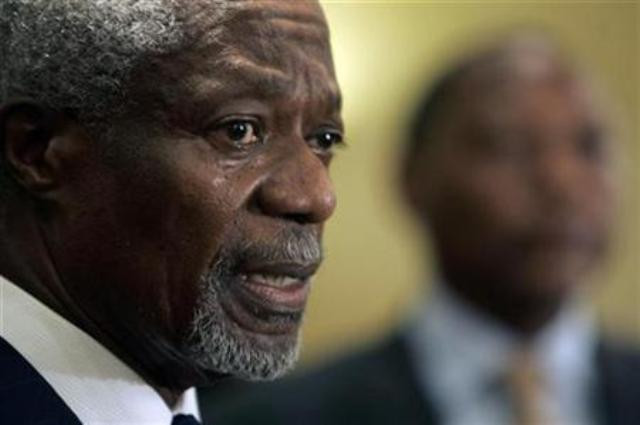Annan presses for unity on Syria, including Iran
Iran's involvement is opposed by the United States, Britain and France, but Annan said it should be at the table.

Iran, an ally and neighbour of Syria, is the subject of a standoff between the United States and Russia, which differ not only on resolving Syria, but also on Iran's nuclear programme.
Annan wants the five permanent members of the UN Security Council and governments with influence on Syria's government or the opposition to agree on recommendations for next steps at a meeting that has been pencilled in for June 30 in Geneva.
But Iran's involvement is opposed by the United States, Britain and France, but Annan said it should be at the table.
"We are discussing the composition and other aspects of the meeting, but I have made it quite clear that I believe Iran should be part of the solution," Annan told a news conference in
Geneva.
In response to Annan's remarks, the US State Department repeated its opposition to Iran taking part, saying Tehran was playing a "destructive" role in Syria.
"We would agree that Iran should be far more constructive with regard to Syria. From our perspective that includes breaking its ties with the Assad regime and stopping what it’s doing in terms of aiding and abetting the violence that is going on," State Department spokeswoman Victoria Nuland said.
"In its current posture, Iran is not playing a constructive role. We don't see any role for it therefore in the conference."
Time Running Out
Despite Annan's peace plan for Syria, violence has raged unabated and appears to be sliding towards a sectarian-tinged civil war pitting majority Sunni Muslims against President Bashar al-Assad's ruling minority Alawite sect.
The fighting has left 1.5 million civilians in need of humanitarian aid, the United Nations said.
Annan's peace has been in doubt since an April 12 ceasefire deadline failed to stop the fighting, which has escalated to the point that a 300-strong UN observer mission was forced to retreat to its bases last Saturday.
"It is only when the international community comes together and sustains its pressure and effort that we get results. Today, honestly speaking, that is not happening," he said, alongside
Major-General Robert Mood, the head of the UN observer mission in Syria.
"The longer we wait, the darker Syria's future becomes."
Time is running out not only because of the rapid escalation of the violence but also because Mood's mandate expires on July 20, which will force the UN Security Council to decide whether or not to carry on.
"If it does continue to escalate, there will come a moment when not only the UN but everybody will see very clearly that the situation is not sustainable ... and is beyond control of everyone. And we don't want to get there," Annan said.
Annan said the attempt to find a peaceful solution could not go on indefinitely if the violence continued, and blamed unnamed countries for worsening the situation by taking national initiatives that were undermining the peace process.
"If we continue the way we are going and competing with each other, it could lead to destructive competition and everyone will pay a price, most of all, the innocent Syrian people in the region," Annan said.












1724319076-0/Untitled-design-(5)1724319076-0-208x130.webp)






COMMENTS
Comments are moderated and generally will be posted if they are on-topic and not abusive.
For more information, please see our Comments FAQ